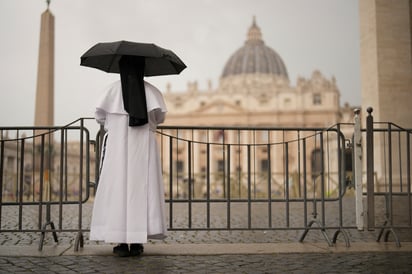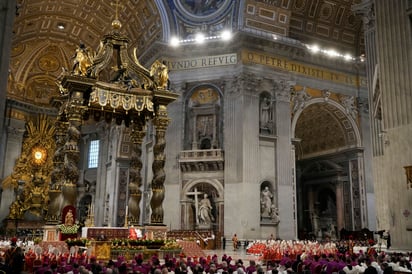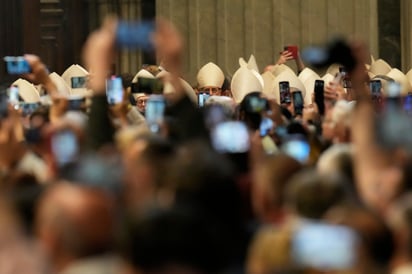Before the conclave, cardinals are asked at Mass to elect a pope who seeks unity.

With all the pageantry, drama, and solemnity the Catholic Church can muster, 133 cardinals began the centuries-old rituals of electing a successor to Pope Francis on Wednesday, attending a morning Mass before the start of the most geographically diverse conclave in the faith's 2,000-year history.
The dean of the College of Cardinals, Cardinal Giovanni Battista Re, led the homily and urged those voting to put aside personal interests and find a pope who values unity. Today's world needs a leader who can raise awareness, he said.
From the altar of St. Peter's Basilica, Re prayed that they might name "the pope our time needs," in his final instructions before the prelates entered the Sistine Chapel to begin the secret ballots.
The cardinals, from 70 countries, will be isolated from the outside world, handed over their cell phones, and coverage around the Vatican will be blocked to prevent them from communicating until they find a new leader for the institution, which has 1.4 billion faithful.
Francis appointed 108 of the 133 "princes of the Church," choosing many religious in his image and likeness from countries such as Mongolia, Sweden, and Tonga. , who had never before had cardinal representation.
His decision to go beyond the usual limit of 120 cardinal electors and include more young people from the so-called "global south"—those countries that are often marginalized and have less economic power—has injected an unusual degree of uncertainty into a process that is always shrouded in mystery and suspense, with smoke signals indicating to the world whether a pope has been elected or not.
Many had not met until last week and regretted not having had more time to do so, raising questions about how long it might take for a religious leader to secure the two-thirds majority, or 89 votes, needed to become the 267th pontiff.
"Wait and see, a little patience, wait and see," said Cardinal Mario Zenari, the Vatican ambassador to Syria.
A final mass and then "Everyone out"
The cardinals began the day by participating in Mass in St. Peter's Basilica, which was attended by Vatican officials and open to the public. Meanwhile, outside, pilgrims endured brief rain showers to watch the ceremony on giant screens.
Re, 91, prayed that the cardinals would find the wisdom, counsel and understanding to choose a worthy new pastor.
Dressed in bright red chasubles, the cardinals processed down the basilica's central aisle to the voices of the Sistine Chapel boys' choir. They took their seats around the main altar, which stands above the traditional burial site of St. Peter, considered the first pope.
Re had presided over Francis' funeral and delivered a moving sermon in which he remembered history's first Latin American pontiff and the 12-year reformist papacy he oversaw.
At 4:30 p.m. (1430 GMT), the cardinals will walk toward the Sistine Chapel in a solemn procession, intoning the meditative "Litany of the Saints" and the Latin hymn "Veni Creator," imploring the saints and the Holy Spirit to help them elect a pope.
Once there, they promise to keep secret what is about to happen. and not allow "any interference, opposition or any other form of intervention" from outsiders that could influence their vote.
Standing before Michelangelo's rendering of heaven and hell in the fresco "The Last Judgment," each cardinal places his hand on the Gospel and swears to fulfill that duty.
The majesty of the chapel's frescoes, particularly those by Michelangelo, seeks to remind the cardinals of the great responsibility they bear. In his regulations for the conclave, Saint John Paul II wrote that in the Sistine Chapel, "everything is conducive to an awareness of the presence of God."
After the cardinals take their oaths, a senior cardinal will offer a meditation. The master of papal liturgical ceremonies, Archbishop Diego Ravelli, will pronounce the Latin phrase "extra omnes," or "all out." Those who are not entitled to vote will then leave, and the chapel doors will be closed so that the work can begin.
The cardinals do not have to hold a first vote on Wednesday, although this is usually the case. Assuming there is no agreement, the Vatican said black smoke could be expected to rise from the chimney above the Sistine Chapel around 7 p.m.
The cardinals will retire for a rest and return Thursday morning. There may be up to two votes in the morning and two more in the afternoon until a winner is determined.
Although the cardinals expressed this week that they expected a short conclave, there will likely be at least a few rounds of voting. Over the past century, it has taken between three and 14 rounds to find a pope. John Paul I—who ruled the Church for 33 days in 1978—was elected in the fourth round. Finding a successor, St. John Paul II, took eight rounds. Francis emerged in the fifth round in 2013.
Pre-conclave lobbying
Although cardinals are supposed to resist any "secular" influence in their election, lobbying has been rife in Rome in recent days, with various groups reminding them of what ordinary Catholics want in a leader.
Young Catholics wrote an open letter reminding the prelates that there is no Church without young people, women, and lay people. The conservative Catholic press sent them copies of a glossy book with their assessments of the candidates. Survivors of clerical sexual abuse warned the cardinals that they would be held accountable if they did not find a leader who would crack down on decades of abuse and cover-up.
Advocates for women's ordination sent pink smoke signals to the Vatican demanding that they be allowed to become priests so they could also vote in a conclave.
Even the White House has gotten involved, publishing a photo of US President Donald Trump dressed as the Pope. The president claimed it was a joke, but the gesture was criticized by former Italian Prime Minister Romano Prodi as "indecent" political interference in matters of faith, reminiscent of times when secular rulers often used religion to stay in power.
Lisette Herrera, a 54-year-old tourist from the Dominican Republic, was deeply moved to find herself, by chance, in Rome at the start of the conclave. On Wednesday morning, she decided to skip visiting the Spanish Steps and the Trevi Fountain to pray in St. Peter's Square.
"I'm praying to the Holy Spirit for a young pope who will stay with us for a long time," he said. "I don't believe in the politics of the conclave; I just feel that the Holy Spirit is here, and that's all we need to know."
Armando Statti, a pilgrim from Crotone, Italy, said he hoped the cardinals would elect a pontiff along the lines of Francis or John Paul II.
"We hope it will be announced as soon as possible, for the good of everyone and for peace, and that it embraces everyone," he said.
Challenges for a new pope
The new pontiff will face a series of challenges that weigh heavily on the cardinals, especially whether to continue and consolidate Francis's progressive legacy of promoting the role of women in the institution, acceptance of the LGBTQ+ community, the environment, and migrants, or to backtrack in an attempt to unify a Church that has become polarized during his pontificate. The clergy sexual abuse scandal loomed over pre-conclave talks.
Given that Francis chose 80% of the voters, continuity is likely, but what form it might take is uncertain.
As a result, identifying the favorites has been a challenge. But some names continue to appear on the lists of "papable" cardinals, that is, cardinals who meet the qualifications for the position.
—Cardinal Pietro Parolin, 70, is an Italian who stands out for the nature of his position: he was secretary of state to Francis, the Vatican's number two, so he is known by all the prelates.
—Filipino Cardinal Luis Tagle, 67, is one of the leading candidates to become the first Asian pope in history. He also held a prominent position heading the Holy See's Office of Evangelization, which is responsible for the Catholic Church in much of the developing world.
— Hungarian Cardinal Peter Erdo, 72, is the Archbishop of Budapest and the leading candidate from the institution's more conservative wing.
(AP)
elsiglodetorreon





